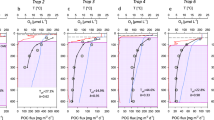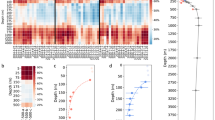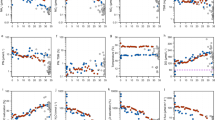Abstract
PELAGIC sediments cover more than half of the Earth's surface1, so that the processes which operate within them are potentially very significant in global terms. The effects of organic diagenesis on the dissolved oxygen and nitrogen content of water trapped in pelagic sediments are reported here. Because of practical difficulties this aspect of geochemistry has received little attention: although Müller2 and Bender et al.3 have provided some insight into its complexity and interest. Data is presented here which suggests strongly that oxygenated pelagic sediments supply a globally significant flux of nitrogen (N2) to the ocean, and that this gas is probably produced by denitrification occurring in microenvironments, such as zooplankton faecal pellets, at or near the sediment–water interface.
This is a preview of subscription content, access via your institution
Access options
Subscribe to this journal
Receive 51 print issues and online access
$199.00 per year
only $3.90 per issue
Buy this article
- Purchase on Springer Link
- Instant access to full article PDF
Prices may be subject to local taxes which are calculated during checkout
Similar content being viewed by others
References
Sverdrup, H. U., Johnson, M. W. & Fleming, R. H. The Oceans (Prentice Hall, Engelwood Cliffs, 1942).
Müller, P. J. Me. ForschEbn. C 22, 1–60 (1975).
Bender, M. L., Fanning, K. A., Froelich, P. N., Heath, G. R. & Maynard, V. Science 198, 605–609 (1977).
Barnes, R. O., Bertine, K. K. & Goldberg, E. G. Limnol. Oceanogr, 20, 962–970 (1975).
Wilson, T. R. S., Mangelsdorf, P. C. & Sayles, F. L. Trans. Am. geophys. Union 53, 293 (1973).
Barnes, R. O. Deep-Sea Res. 20, 1125–1128 (1973).
Sayles, F. L., Wilson, T. R. S., Hume, D. N. & Mangelsdorf, P. C. Science 181, 154–156 (1973).
Sayles, F. L., Mangelsdorf, P. C., Wilson, T. R. S. & Hume, D. N. Deep-Sea Res. 23, 259–264 (1976).
Benson, B. B. & Parker, P. D. M. Deep-Sea Res. 7, 237–253 (1961).
Smith, K. L. & Teal, J. M. Science 179, 282–3 (1973).
Eriksson, E. The atmosphere and the Sea in Motion 147–157 (Rockerfeller Instn., New York, 1959).
Söderlund, R. & Svensson, B. H. Scope Rep. 7 ecol. Bull. 22, 23–73 (1975).
Horne, R. A. Marine Chemistry (Wiley-Interscience, New York 1969).
Murray, C. M., Riley, J. P. & Wilson, T. R. S. Deep-Sea Res. 16, 297–310 (1969).
Bishop, J. K. B., Edmond, J. M., Ketten, D. E., Bacon, M. P. & Silker, W. B. Deep-Sea Res. 24, 511–548 (1977).
Armstrong, F. A. J. Analyt. Chem. 35, 1292–1294 (1963).
Author information
Authors and Affiliations
Rights and permissions
About this article
Cite this article
WILSON, T. Evidence for denitrification in aerobic pelagic sediments. Nature 274, 354–356 (1978). https://doi.org/10.1038/274354a0
Received:
Accepted:
Issue Date:
DOI: https://doi.org/10.1038/274354a0
This article is cited by
-
Ammonia-oxidizing archaea have similar power requirements in diverse marine oxic sediments
The ISME Journal (2021)
-
Nitrogen Cycles: Past, Present, and Future
Biogeochemistry (2004)
-
Denitrification measurements in aquatic sediments: A comparison of three methods
Biogeochemistry (1993)
-
Origins and microenvironments of bacteria mediating fecal pellet decomposition in the sea
Marine Biology (1983)
Comments
By submitting a comment you agree to abide by our Terms and Community Guidelines. If you find something abusive or that does not comply with our terms or guidelines please flag it as inappropriate.



